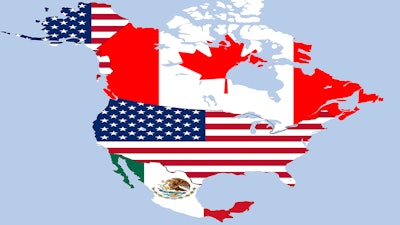
This week the AFL-CIO released their "blueprint" for rewriting the North American Free Trade Agreement (NAFTA)in a way that they feel could help more working families. The AFL-CIO has long supported rewriting the rules of NAFTA, and feel their outline could raise wages in all three North American countries. The organization's key areas for improvement entail:
- Eliminating the private justice system for foreign investors. NAFTA established a private justice system for foreign investors. This private justice system, known as investor-state dispute settlement, or ISDS, allows foreign investors to challenge local, state and federal laws before private panels of corporate lawyers. Although these lawyers are not accountable to the public, they are empowered to decide cases and award vast sums of taxpayer money to foreign businesses. The AFL-CIO feels the ISDS can give foreign investors enormous leverage to sway public policies in their favor, and that scrapping the entire system would help level the playing field for smaller manufacturers.
- Improve the labor and environment side-treaties (the North American Agreement on Labor Cooperation and the North American Agreement on Environmental Cooperation). The AFL-CIO feels these agreements should be scrapped and replaced with standards that more robustly protect international labor and environmental standards. Violators should be subject to trade sanctions when necessary.
- Address currency manipulation by creating binding rules subject to enforcement and possible sanctions. Within months after NAFTA’s approval by Congress, Mexico devalued the peso. This devaluation made imports from Mexico cheaper and priced many U.S. exports out of reach of average Mexican consumers. The organization feels all U.S. trade agreements, including NAFTA, should be upgraded to create binding rules, subject to trade sanctions, to prevent such manipulation.
- Upgrade NAFTA’s rules of origin, particularly on autos and auto parts, to reinforce auto sector jobs in North America. NAFTA’s rules require that automobiles be 62.5 percent “made in North America” to qualify for duty-free treatment under NAFTA. Even though 62.5 percent is higher than the TPP’s 45 percent, it still allows for nearly 40 percent of a car to be made in China, Thailand or elsewhere. The AFL-CIO feels that the auto rule of origin should be upgraded to eliminate loopholes.
- Delete the procurement chapter that undermines “Buy American” laws (Chapter 10). NAFTA contains provisions that require the U.S. government to treat Canadian and Mexican goods and services as “American” for many purchasing decisions, including purchases by the Departments of Commerce, Defense, Education, Veterans Affairs and Transportation. The AFL-CIO feels this entire chapter should be deleted.
- Upgrade the trade enforcement chapter (Chapter 19). NAFTA allows for a final review of a domestic anti-dumping or countervailing duty case by a binational panel instead of by a domestic court. The AFL-CIO feels this rule, omitted from subsequent trade deals, has hampered trade enforcement, hurting U.S. firms and their employees and should be improved or omitted.
To see the post in its entirety, click here.





















